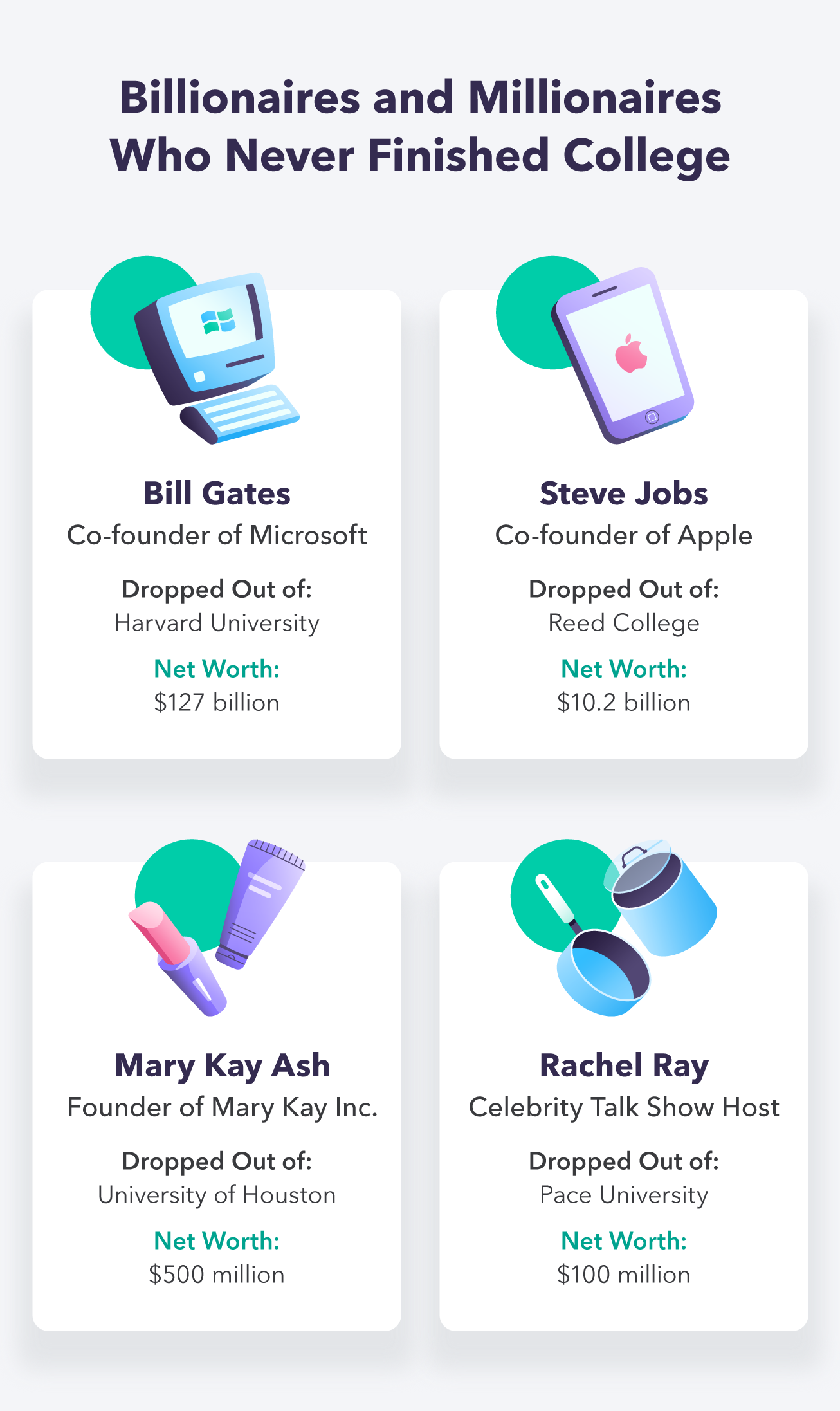Although college is a great way to invest in yourself, it’s not always for everyone. A college degree may be a stepping stone to overall success, but 43.2 million Americans have also left college with an average of $39,351 in student debt. Take inspiration from the likes of college dropouts, like Steve Jobs and Racheal Ray, and build your wealth without a university degree. Check out the 25 highest paying jobs without a degree to find your alternative path to professional and financial success.
Jump down to the infographic for a visual of the top-paying jobs as well as inspiration from other highly successful people without degrees.
Note: We used the Bureau of Labor Statistics’ median salary data from 2019 to compile this list and infographic.
1. Transportation, Storage, and Distribution Managers
This highest paying job without a degree involves all activities relating to the planning and coordination of distribution, transportation, or storage. Transportation, storage, and distribution managers are responsible for directing these activities in accordance with government regulations and organizational policies. Tasks include planning and implementing warehouse safety, supervising shipping, receiving, storing, and testing of products, and integrating logistics with business operations. With just a high school diploma and five years of experience getting things where they need to go, you can level up to this higher position and higher salary.
- Education: High school diploma or equivalent
- Years of Experience: 5 or more years
- Median Income: $94,560
- Projected Jobs: 4,900
2. Police and Detective Supervisors
First-line supervisors in this occupation directly oversee detectives and police officers, and they offer expertise in coordinating the investigation of criminal cases. Responsibilities include the training and management of personnel to conduct police operations according to the law. With just a high school diploma required, you’ll be well-rewarded for rising up through the police force with a close to six-figure salary.
- Education: High school diploma or equivalent
- Years of Experience: Less than 5 years
- Median Income: $91,090
- Projected Jobs: 6,600
3. Commercial Pilots
While airline pilots typically need a bachelor’s degree, commercial pilots perform a similar job without one. Commercial pilots operate and fly aircraft, such as helicopters and airplanes that aren’t affiliated with airlines. Their responsibilities include preparing and inspecting aircraft conditions, making flight plans, communicating with air traffic controllers, and navigating aircraft. Unlike airline pilots, commercial pilots generally perform unscheduled flights such as charter flights and aerial tours. Reap the benefits of pilot’s salary while getting to stay closer to home.
- Education: High school diploma or equivalent, commercial pilot’s license
- Years of Experience: Less than 5 years (500 to 1,500 hours minimum flight experience)
- Median Income: $86,080
- Projected Jobs: 45,400
4. Elevator and Escalator Installers and Repairers
Installers and repairers of elevators and escalators are tasked with fixing, maintaining, and installing lifts and movable walkways. This occupation requires workers to work at tall heights and in cramped spaces. Full-time workers may have to work overtime or be on call for entire days. Despite the working conditions, they’re compensated well. Start your path to becoming an elevator and escalator installer or repairer by obtaining a high school diploma and gaining experience with an apprenticeship.
- Education: High school diploma or equivalent and apprenticeship
- Years of Experience: Less than 5 years
- Median Income: $84,990
- Projected Jobs: 30,800
5. Firefighting Supervisors
Supervisors in this career are responsible for overseeing and coordinating the work of firefighters and any others involved in fire prevention and control. Firefighting supervisors function as leaders of their crew and are involved in communicating fire details to all personnel, administering medical services, assessing fires, and strategically assigning firefighters to rescue and extinguish fires. You can work your way up to this supervisory position in less than five years and start earning well above the standard median income in the United States.
- Education: Postsecondary nondegree award, on-the-job training
- Years of Experience: Less than 5 years
- Median Income: $77,800
- Projected Jobs: 4,400

6. Transportation Inspectors
Another transportation career with a high salary and no degree requirement is a transportation inspector. This job is responsible for inspecting products or equipment that are involved in the transportation of people or cargo. Inspectors can specialize in freight, rail transportation, or other vehicles. Duties include inspecting shipments for security, recording freight conditions and handling, observing loading for compliance, and offering expertise when stowing heavy or dangerous cargo. If you’re interested in transportation and management isn’t for you, this role is a well-paying alternative to being a transportation manager.
- Education: High school diploma or equivalent, on-the-job training
- Years of Experience: None
- Median Income: $75,820
- Projected Jobs: 700
7. Theatrical Performance Makeup Artists
Makeup artists who apply makeup for theatrical performances are compensated generously for their work and artistry. Theatrical makeup artists generally use makeup to convey a certain period or setting that enhances the performer and their role. Their craft requires them to have precision in their work when duplicating looks for characters on a regular basis, and they specialize in using a variety of materials to achieve their looks.
- Education: Postsecondary nondegree award
- Years of Experience: None
- Median Income: $75,730
- Projected Jobs: 500
8. Non-Retail Sales Supervisors
In this role, individuals supervise non-retail sales workers and may also take on budgeting and accounting responsibilities. Non-retail sales supervisors manage their staff and offer guidance in hitting sales goals and resolving problems regarding services or products. Although this occupation’s jobs are projected to decline, the current job landscape indicates a robust field with 409,800 employed in 2019.
- Education: High school diploma or equivalent
- Years of Experience: Less than 5 years
- Median Income: $74,760
- Projected Jobs: -34,100
9. Lighting, Media, and Communication Equipment Workers
Individuals who work as lighting technicians or media and communication equipment workers are well-compensated for their services. This career finds high levels of employment in the following industries: radio and television broadcasting, motion picture and video, colleges and universities, rental and leasing services, and federal government. Jump into this career after earning a high school diploma and going through short-term on-the-job training.
- Education: High school diploma or equivalent, on-the-job training
- Years of Experience: None
- Median Income: $73,460
- Projected Jobs: 1,300
10. Electrical Power-Line Installers and Repairers
This career consists of maintaining and installing the power grid, and entry-level positions require a high school diploma. Electrical power line installers install power line networks and repairers service high-voltage lines and towers or even street and traffic lights. Typical duties include inspecting power lines, identifying defects in the power grid, and climbing poles to string power lines. These electrical line installers and repairers work in dangerous conditions off of the ground and with high-voltage electricity. This risk may be balanced by the strong projected job growth and compensation.
- Education: High school diploma or equivalent, on-the-job training
- Years of Experience: None
- Median Income: $72,520
- Projected Jobs: 116,900

11. Agricultural Managers
Agricultural managers, farmers, and ranchers make a decent salary producing livestock, dairy, or crops. This occupation typically needs a high school diploma to get started, but as farm management grows more complex, a secondary degree may be necessary. Agricultural manager positions are expected to decline as farms become more efficient, but about 81,000 job openings are projected each year for the next decade. Explore this career if you enjoy working outdoors with crops or animals.
- Education: High school diploma or equivalent
- Years of Experience: 5 or more years
- Median Income: $71,160
- Projected Jobs: -61,600
12. Subway and Streetcar Operators
With just a high school diploma and moderate on-the-job training, you can operate subways, suburban trains, or streetcars for a salary over $60,000. As a streetcar or subway operator, you transport passengers by operating the train or streetcar controls, driving and regulating the vehicle on a railway, and conducting emergency procedures when necessary. This role is another high-paying transportation job that doesn’t require reaching the management level to be paid well.
- Education: High school diploma or equivalent, on-the-job training
- Years of Experience: None
- Median Income: $67,880
- Projected Jobs: 600
13. Mechanic Supervisors
This role is in charge of supervising the work of mechanics, repairers, or installers. Mechanic supervisors deal with scheduling and assigning work based on an employee’s skills, reviewing work performance, maintaining safety procedures, and investigating accidents. It takes less than five years of experience to reach a supervisory level, and with a 3 percent projected job growth rate, it will be possible to grow into this role quickly.
- Education: High school diploma or equivalent
- Years of Experience: Less than 5 years
- Median Income: $67,460
- Projected Jobs: 13,300
14. Construction and Extraction Supervisors
Supervisors of construction and extraction workers coordinate and inspect work activities and ensure that safety standards are met on work sites. It typically takes five or more years of experience in extraction or other construction trade to reach this role. However, with this area growing faster than average at 5 percent, once you have the experience, there will be plenty of job openings on the market.
- Education: High school diploma or equivalent
- Years of Experience: 5 or more years
- Median Income: $66,210
- Projected Jobs: 33,000
15. Police Officers
If you’re at least 21 years old, have a high school diploma and valid driver’s license, and are a U.S. citizen, becoming a police officer is a career option for those who don’t possess a degree. In addition to those eligibility requirements, written and physical exams must be passed before becoming a cadet. Police cadets typically attend a training academy to learn about federal, state, and local laws, civil rights, and ethics. They’ll also receive on-the-job training to be able to perform duties such as traffic control, self-defense, first aid, patrol, and emergency response. After completing training and passing a series of interviews, cadets are allowed to become police officers.
- Education: High school diploma or equivalent, on-the-job training
- Years of Experience: None
- Median Income: $65,170
- Projected Jobs: 40,600

16. Aircraft Mechanics and Service Technicians
Avionic mechanics and service technicians perform routine maintenance or make repairs to aircraft. After completing high school, mechanics and technicians can get technical training and complete a certification at an aviation technician school that is approved by the Federal Aviation Administration (FAA). Another pathway is to start training on the job with constant supervision in order to gain enough experience to become certified. Responsibilities include fixing electrical or mechanical issues and repairing parts relating to the brakes, wings, and other electrical components.
- Education: High school diploma or equivalent, additional technical training
- Years of Experience: None
- Median Income: $64,310
- Projected Jobs: 7,300
17. Correctional Supervisors
Supervising and coordinating the activities of jailers and correctional officers is another job that doesn’t require a degree. Correctional supervisors are in charge of the custody, discipline, and welfare of inmates, and they’re also tasked with maintaining order and enforcing rules and regulations at the correctional facility. At times, they must direct operations in emergency situations like during escapes. This occupation is expected to decline over the next decade.
- Education: High school diploma or equivalent
- Years of Experience: Less than 5 years
- Median Income: $63,730
- Projected Jobs: -3,800
18. Stationary Engineers and Boiler Operators
Boiler operators and stationary engineers are responsible for operating mechanical equipment, specifically boilers and stationary engines. In order to qualify for a job in this role, you will need a high school diploma and will learn your trade through long-term on-the-job training. An apprenticeship will also help you get the experience you need and yield natural job opportunities. Before becoming employed, you’ll have to demonstrate competency by passing an exam or obtaining a license.
- Education: High school diploma or equivalent, on-the-job training
- Years of Experience: None
- Median Income: $62,150
- Projected Jobs: 800
19. Farm Labor Contractors
Interested in earning $60,000 a year without a high school diploma? With some short-term on-the-job training, you can learn to recruit and hire temporary or seasonal farm workers. Some farm labor contractors may need a high school diploma, but less than five years of experience as an apprentice or employee also qualifies. This job involves supervising agricultural laborers, paying their wages, and providing resources for food, water, shelter, transportation, and sanitation during their contracted work.
- Education: No formal education required
- Years of Experience: Less than 5 years
- Median Income: $61,910
- Projected Jobs: 100
20. Fire Inspectors
Generally, fire inspectors and investigators have a background in fighting fires and have postsecondary training from that field. With that being said, a high school diploma and on-the-job training provide the basic foundation you need to get started. Fire inspectors identify fire hazards, ensure fire codes are met, test fire extinguishing systems, review evacuation plans, and offer education on fire safety. Investigators are tasked with analyzing evidence from fires, documenting it, and determining the cause and origin. If you’re interested in this field, either route will earn a median salary above $60,000.
- Education: High school diploma or equivalent, on-the-job training
- Years of Experience: Less than 5 years
- Median Income: $61,660
- Projected Jobs: 800

21. Production and Operations Supervisors
In these positions, you’re responsible for supervising the work of production and operating workers. Operations and production supervisors handle work records, plan schedules, inspect products and equipment, evaluate product estimates and output, and maintain compliance with sanitation and safety regulations. It takes less than five years to reach a supervisory position in this field, but it’s important to note that the growth rate is declining.
- Education: High school diploma or equivalent
- Years of Experience: Less than 5 years
- Median Income: $61,310
- Projected Jobs: -2,000
22. Executive Assistants
Looking for a job that has no technical training or degree involved? Become an executive secretary or assistant and set yourself up for success with some basic office experience and skills. Typically, this role consists of more complex clerical and administrative work for high-level executives. Tasks include reviewing communications, doing research, and compiling reports. Although a decent job decline is expected in this occupation, job openings will still occur when an existing job holder leaves the field. With nearly 600,000 executive assistants employed in 2019, there will be plenty of opportunities on the job market.
- Education: High school diploma or equivalent
- Years of Experience: Less than 5 years
- Median Income: $60,890
- Projected Jobs: -121,100
23. Construction and Building Inspectors
Building and construction inspectors review construction to make sure all necessary building codes and zoning regulations are met and all contractual requirements and local ordinances are followed. Inspectors are required to have a high school diploma, and most states also require a license or certification. Training happens on the job, and it varies by location and type of inspector.
- Education: High school diploma or equivalent, additional license or certification
- Years of Experience: 5 or more years
- Median Income: $60,710
- Projected Jobs: 3,900
24. Court Reporters
To qualify for an entry-level court reporter position, you’ll need to complete a certificate from a community college or technical school. Certifications will prepare you to pass typing-speed exams and obtain a license, which is required in many states. After gaining your credentials, you will work in court creating word-for-word transcripts of proceedings, hearings, and depositions. Court reporting is essential to legal proceedings, and you can feel confident about doing work that benefits society while also getting paid well for it.
- Education: Postsecondary nondegree award, on-the-job training
- Years of Experience: None
- Median Income: $60,130
- Projected Jobs: 1,400
25. Property Managers
You don’t need a college degree to manage real estate, property, or community associations. Property managers maintain the operations and appearance of real estate or communities in order to generate income from the property. Their tasks include showing property to potential renters, discussing financial options and terms of leasing, conducting inspections, scheduling repairs, and running operations according to fair housing laws. Although this occupation isn’t in a decline, automation of property management has slowed this field’s growth.
- Education: High school diploma or equivalent
- Years of Experience: Less than 5 years
- Median Income: $58,760
- Projected Jobs: 800
Successful People Without A College Degree
Need some inspiration for what it takes to be successful without a college degree? Learn from the examples of these uber-successful business moguls and entrepreneurs who never started or finished college.
Just remember, if you’re already in college and have student loans, you’ll still need to repay your loans even if you don’t complete your degree. Think about the investment you’ve made so far and evaluate whether your degree is worth it before deciding it’s not for you.

Rebecca Minkoff
At the age of 18, Rebecca Minkoff decided to forgo college and pursue her dream of becoming a fashion designer by moving to New York City. She quickly became an overnight sensation when one of her designs was featured on The Tonight Show, and her iconic designer bags solidified her status in fashion and lifestyle. Today, she is an award-winning designer recognized for her apparel and accessories, and she has a net worth of $10 million.
Steve Jobs
Apple co-founder, Steve Jobs, never completed his degree at Reed College. He has said that his time at Reed did help inspire the design of Apple’s Macintosh computer. However, even with a lack of a college degree, Jobs managed to amass a $10.2 billion net worth at the time of his death.
Rachael Ray
Talk show host and celebrity food personality, Rachael Ray, spent two years at university before dropping out to concentrate on work. She put on “30 Minute Meals” while working at a gourmet food store and eventually landed on local television. From there she went on to do cooking shows on the Food Network and turned her following into a food empire and net worth of $100 million.
Bill Gates
Bill Gates is a Harvard dropout, but who needs a Harvard degree when your computer programming projects are earning you $20,000 at the age of 17. Gates would go on to enroll at Harvard, but his coding and programming abilities would garner him a job offer before he ever completed his degree. That job offer turned into a business partnership and Microsoft was born, catapulting Gates to fame and fortune for creating one of the world’s top software companies. With a $127 billion net worth, read one of his book recommendations to help level up your money mindset.
Mary Kay Ash
Mary Kay Ash launched her iconic beauty business in 1963 in an effort to empower women and disrupt a male-dominated workforce. Ash’s company, Mary Kay Inc., went on to achieve global success and recognition and earned her a net worth of $500 million at the time of her death in 1984. Although Ash didn’t originally attend college, she eventually pursued a degree at the University of Houston but dropped out after a year.
Mark Zuckerberg
Multi-billionaire Mark Zuckerberg seems to have managed quite well without a college degree. Like Gates, the CEO and founder of Facebook is also a Harvard dropout. He started his successful social network while at university and dropped out to pursue it full time. With a net worth of over $113 billion, we can say he definitely found his best path to success.
A college degree isn’t the exact formula for success. With the right spending and saving habits, you can grow your wealth by working one of these high paying jobs without a degree. Try perfecting your budget based on your salary with the Mint app and take charge of your financial future today.

Sources: U.S. Bureau of Labor Statistics | Education Data | Inside Highered | Glassdoor | Bloomberg | Celebrity Net Worth | Discover Praxis | Investopedia | Wealthy Genius | Yahoo |


